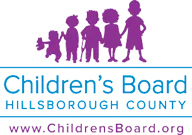Children’s Services Councils
What’s a Children’s Services Council?
The Children’s Board of Hillsborough County is one of the Children’s Services Councils in the State of Florida. You may not have heard of a Children’s Services Council before, but you’re probably very familiar with the organizations Children’s Services Councils support such as the Boys & Girls Clubs, Healthy Start Coalitions, Big Brothers/Big Sisters, Children’s Home Network, and many more. Children’s Services Councils, or CSCs, are a type of government entity established by county citizens to help fund organizations that serve children and families like the ones mentioned above. They were also created to ensure tax dollars are being spent wisely and invested in programs that will provide the best outcomes for the children and families within their communities. Their top priority is to make sure children of all ages are healthy, safe and prepared to learn.
For the Children, By the People!
Children’s Services Councils are created through the will of the people. They are first established by a county commission through a local ordinance. Voters can then approve taxing authority for a Children’s Services Council through a countywide referendum. Florida is the only state in the nation with laws that allow local county leaders and the residents of those counties to create a special government entity that’s sole purpose is to invest in the well-being of children and families.
A Tale of Two Children’s Services Councils
There are two different kinds of Children’s Services Councils. A county and its residents can choose to create an independent or a dependent Children’s Services Council. Both are focused on funding programs for children and families. The biggest difference is the source of those funds.
Independent Children’s Services Councils have voter-approved taxing authority to ensure a dedicated funding source is available for children’s programs and services. Voters in a county with an independent Children’s Services Council pay a portion of their property taxes toward their CSC and the programs they fund. For an approximate average annual cost to the taxpayer of $50 to $60 (depending on the county), Children’s Services Councils are able to fund programs that meet the specific needs of the people living in their communities.
Dependent Children’s Services Councils perform essentially the same functions as independent CSCs, but they do not have taxing authority. Their funding primarily comes from the county’s property tax revenues and falls under the county’s annual budget.
What CSCs Do
In addition to serving as the administrator of county funds to children and family programs, all Children’s Services Councils collect information and statistical data, monitor program/provider performance, and conduct local strategic planning. Essentially, CSCs serve as the hub of child advocacy in a county, bringing together the right people, organizations, and funding opportunities to ensure a brighter future for Florida’s children and youth. No other public entity provides this kind of umbrella for leadership, coordination, and oversight of efforts focused on children.
Children’s Services Councils help families by:
- Ensuring the best use of taxpayer dollars and working to serve the greatest number of children
- Determining the specific needs of children, youth, and families
- Coordinating with other agencies, public/private funders, and stakeholders dedicated to the welfare of children
- Leveraging funding for major state programs like:
What’s in it for My County?
There is tremendous benefit to a county with its own Children’s Services Council. While the services offered and age groups served vary depending on the needs of the community, the primary focus is investing in prevention and early intervention programs. This reduces the need for more costly services later in life.
Children’s Services Councils:
- Serve all children, not just a particular demographic or economic segment of the population
- Use local resources more efficiently
- Bring key players to the same table and promote long-term thinking beyond one fiscal cycle
- Generate a new source of local funds
- Allocate funds directly to community needs
- Respond to changing priorities and issues among children and families

